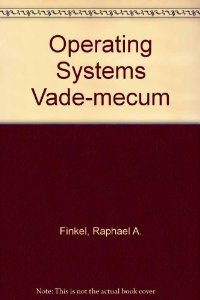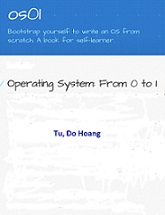
|
FreeComputerBooks.com
Links to Free Computer, Mathematics, Technical Books all over the World
|
|
- Title: An Operating Systems Vade Mecum, Second Edition
- Author(s) Raphael A. Finkel
- Publisher: Prentice Hall 1988
- Hardcover/Paperback: ?
- eBook: PDF (362 pages, 1.3 MB)
- Language: English
- ISBN-10: 0136374557
- ISBN-13: 978-0136374558
- Share This:

|
Traditionally, a vade mecum (pronounced "VAHdee MAYkem") is a laboratory manual that guides the student step by step through complex procedures. Operating systems are complex mixtures of policy and mechanism, of algorithm and heuristic, and of theoretical goals and practical experience. This vade mecum tries to unify these diverse points of view and guide the novice step by step through the complexities of the subject.
As a text, this book is intended for a first course in operating systems at the undergraduate level. The subject has so many individual parts that its practitioners and teachers often concentrate on subareas and ignore the larger concepts that govern the entire subject.
This book has tried to rectify that situation by structuring the presentation about the dual ideas of resource management and beautification.
About the Authors- N/A
- Operating Systems Design and Construction
- Unix/Linux Programming - System and Applications
- Parallel Computing and Programming

- An Operating Systems Vade Mecum, Second Edition (Raphael A. Finkel)
- The Mirror Site (1) - PDF
- The Mirror Site (2) - PDF
-
 Operating Systems: Three Easy Pieces (Remzi Arpaci-Dusseau)
Operating Systems: Three Easy Pieces (Remzi Arpaci-Dusseau)
A book covering the fundamentals of operating systems, including virtualization of the CPU and memory, threads and concurrency, and file and storage systems. It will lead students to a deeper understanding and appreciation of modern OSes.
-
 Operating System: From 0 to 1 (Tu, Do Hoang)
Operating System: From 0 to 1 (Tu, Do Hoang)
Bootstrap yourself to write an OS from scratch. A book for self-learner. This book helps you gain the foundational knowledge required to write an operating system from scratch. It teaches you core concepts, such as x86 Assembly, ELF, linking and debugging, etc.
-
 Operating Systems and Middleware: Support Controlled Interaction
Operating Systems and Middleware: Support Controlled Interaction
Intended for juniors, seniors, and first-year graduate students, this book takes a modern approach to the traditional Operating Systems course. Students will obtain an understanding of how contemporary operating systems and middleware work
-
 Computer Science from the Bottom Up - From Operating Systems
Computer Science from the Bottom Up - From Operating Systems
It aims to teach computer science from the bottom end up - working from operating systems fundamentals through to how those applications are complied and executed, so you might be able to figure out where to start looking to make sense of it all.
-
 Programming Persistent Memory: A Comprehensive Guide
Programming Persistent Memory: A Comprehensive Guide
The book explains fundamental concepts, provides an introduction to Persistent Memory programming APIs for C, C++, JavaScript, and other languages, discusses RMDA with persistent memory; reviews security features; and presents many examples.
-
 Think OS - A Brief Introduction to Operating Systems
Think OS - A Brief Introduction to Operating Systems
This book is for systems programmers, software engineers, programmers, and other professionals who want to teach themselves the fundamentals of operating systems or enhance their understanding of operating systems and distributed systems issues.
-
 The Little Book about OS Development (Erik Helin, et al)
The Little Book about OS Development (Erik Helin, et al)
his book is a practical guide to writing your own x86 operating system. It is designed to give enough help with the technical details while at the same time not reveal too much with samples and code excerpts.
-
 TinyOS, an Embedded Operating System
TinyOS, an Embedded Operating System
TinyOS is an embedded, component-based operating system and platform for low-power wireless devices, such as those used in wireless sensor networks (WSNs), smartdust, ubiquitous computing, personal area networks, building automation, and smart meters.
-
 PaulOS: An 8051 Real-Time Operating System (Paul P. Debono)
PaulOS: An 8051 Real-Time Operating System (Paul P. Debono)
This book covers mainly the 8051 family of micro-controllers starting with the basic architecture and then moves on to assembly language and Real-Time Operating System (RTOS) where three main types of self-developed RTOSs are discussed.
-
 How to Make a Computer Operating System From Scratch
How to Make a Computer Operating System From Scratch
This book is about how to write a computer operating system in C/C++ from scratch. The goal is to build a very simple UNIX-based operating system, not just a 'proof-of-concept'. The OS should be able to boot, start a userland shell, and be extensible.
-
 Baking Pi - Operating Systems Development
Baking Pi - Operating Systems Development
This online book is to guide you through the process of developing very basic operating systems on the Raspberry Pi! It you through the basics of operating systems development in assembly code.
-
 Project Oberon - The Design of an Operating System and Compiler
Project Oberon - The Design of an Operating System and Compiler
This book contains a definition of the Oberon Language and describes its relation to Modula-2 and the software tools developed with the system. This definitive, first-hand account of the design, development, and implementation of Oberon completes the Oberon trilogy.





